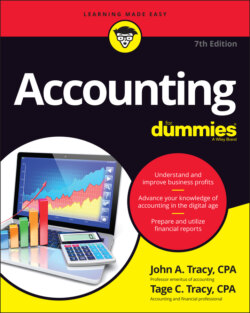Читать книгу Accounting For Dummies - John A. Tracy - Страница 72
Enforcing Strong Internal Controls
ОглавлениеAny accounting system worth its salt should establish and vigorously enforce effective internal controls — basically, additional forms and procedures over and above what’s needed strictly to move operations along. These additional procedures serve to deter and detect errors (honest mistakes) and all forms of dishonesty by employees, customers, suppliers, and even managers themselves. Unfortunately, many businesses pay only lip service to internal controls; they don’t put into place good internal controls, or they don’t seriously enforce their internal controls (they just go through the motions).
Internal controls are like highway truck weigh stations, which make sure that a truck’s load doesn’t exceed the limits and that the truck has a valid plate. You’re just checking that your staff is playing by the rules. For example, to prevent or minimize shoplifting, many retailers use video surveillance as well as tags that set off the alarms if the customer leaves the store with the tag still on the product. Likewise, a business should implement certain procedures and forms to prevent (as much as possible) theft, embezzlement, kickbacks, fraud, and simple mistakes by its own employees and managers.
The Sarbanes-Oxley Act of 2002 (often referred to as SOX) applies to public companies that are subject to the federal Securities and Exchange Commission (SEC) jurisdiction. Congress passed this law mainly in response to Enron and other massive financial reporting fraud disasters. The act, which is implemented through the SEC and the Public Company Accounting Oversight Board (PCAOB), requires that public companies establish and enforce a special module of internal controls over external financial reporting.
Although Sarbanes-Oxley applies legally only to public companies, the accounting profession has taken the position that requirements of the law are relevant to all businesses. As a matter of fact, independent CPA auditors in their audit report state whether they think the internal controls over financial reporting are adequate for preventing misleading financial statements.
